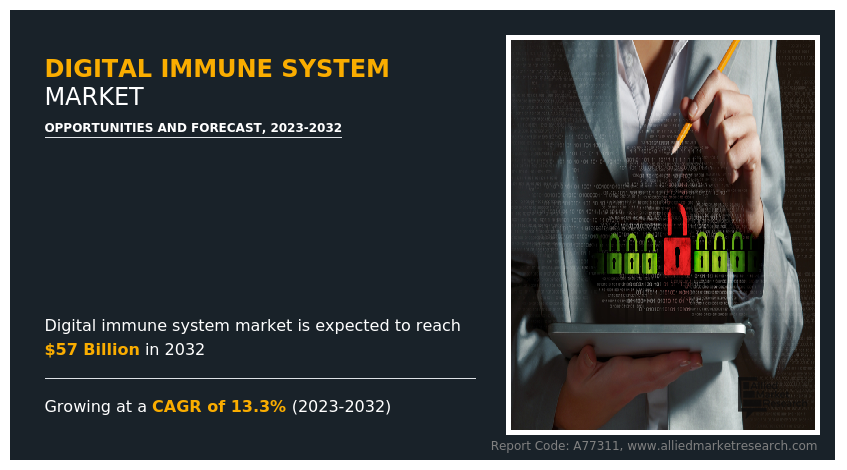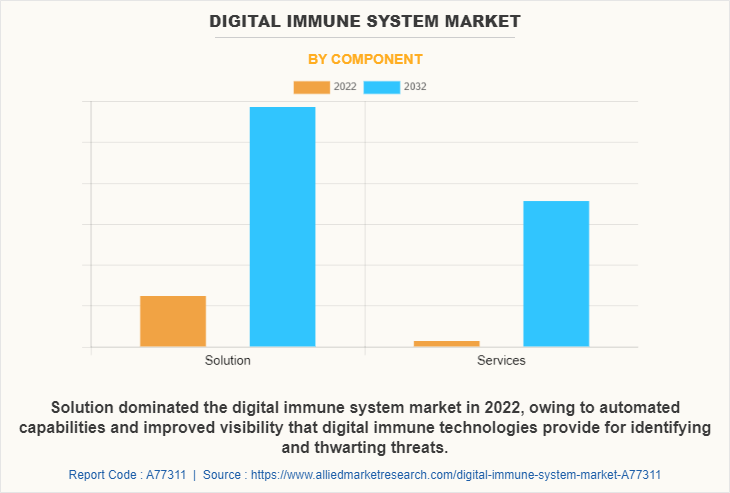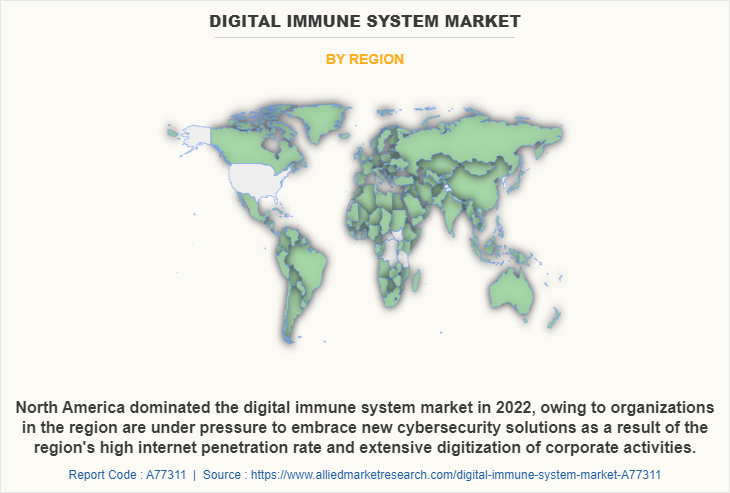Digital Immune System Market Insights:
The global digital immune system market was valued at USD16.8 billion in 2022 and is projected to reach USD 57 billion by 2032, growing at a CAGR of 13.3% from 2023 to 2032.
Rise in concerns about cyberattacks and loT and BYOD trends impact the growth of the digital immune system market size. Moreover, the market growth is affected by lack of understanding among consumer regarding security. In addition, increase in use of mobile platforms and applications and rise in threat of phishing and malware among businesses influence the market growth. However, each of these factors is expected to have a definite impact on the growth of the global digital immune system market during the forecast period.

A digital immune system (DIS) includes technologies and tools for software design, development, operations, and analytics to reduce business risks. Applications are made more resilient so that they can recover from failures rapidly owing to a strong digital immune system, which shields them from abnormalities such as the effects of software flaws or security problems. In addition, it can minimize the risks to business continuity brought on by damaged or non-existent vital apps and services. Moreover, enterprises have to contend with increased difficulties in maintaining dependable end-user experiences, rapid digital delivery, and robust operating environments.
Furthermore, with increase in installation of the system, companies anticipate to innovate swiftly and respond rapidly to upcoming market changes. A digital immune system is created to protect against cyberattacks and other hostile actions on hardware, networks, and computer systems. It works by continuously scanning the network and systems for signs of potential threats and subsequently taking appropriate preventative measures to eliminate or decrease those risks. This may require identifying & containing infected devices, detecting & stopping hostile communications, and addressing security flaws.
For the purpose of analysis, the global digital immune system market scope covers segmentation based on component, deployment mode, security type, industry vertical, and region. On the basis of component, the market is bifurcated into solutions and services. Depending on deployment mode, it is segregated into on-premise and cloud. By security type, it is fragmented into network security, cloud security, endpoint security, internet of things (IoT) security, and others. By industry vertical, it is divided into IT & telecom, BFSI, manufacturing, education, healthcare, government, and others. Region wise, it is analyzed across North America, Europe, Asia-Pacific, and LAMEA.
The market players operating in the digital immune system industry are International Business Machines Corporation, Cisco System, Inc., Palo Alto Networks Inc, Trend Micro Incorporated, Broadcom, McAfee, LLC, FireEye, Inc., HCL Technologies Limited, Check Point Software Technologies Ltd., and Microsoft Corporation. These major players have adopted various key development strategies such as business expansion, new product launches, and partnerships, which help to drive the growth of the digital immune system industry globally.

On the basis of component, the solution segment dominated the global digital immune system market share, owing to the adoption of these solutions is further aided by the automated capabilities and improved visibility that digital immune technologies provide for identifying and thwarting threats. In addition, digital immune solutions continuously gather data and perform analytics, combining them into a single view. Security teams may then quickly access and apprehend the state of all their networks.
However, the services segment would also showcase the fastest growth during the forecast period, owing to more effectively detecting, investigating, and responding to cyberattacks. In addition, these services enhance the use of software programs, maximize the cost of an existing installation by optimizing it, and reduce deployment costs & risks, all of which contribute to the growth of the market. There is an increase in the use of consulting services by businesses to develop and manage attractive and durable digital immune system offerings tailored to their particular requirements, which promote long-term, profitable growth.

Region-wise, North America dominated the global digital immune system market growth in 2022, and is projected to retain its dominance by 2032, owing to rise in demand is driven by the growing awareness among organizations in this region about data security and compliance with the most recent rules established by the governments of these nations. Moreover, the demand for digital immune system is rising owing to the fact that it aids an organization in keeping track of, detecting, reporting, and thwarting cyber threats, which are internet-based attempts to compromise sensitive data through phishing, spyware, and malware. However, the Asia-Pacific region would also portray the fastest growth during the forecast period, owing to the increasing severity of these attacks and strict government regulations, it is anticipated that the Asia-Pacific digital immune system market will grow at a notable pace.
Top Impacting Factors:
Rise in Concerns About Cyberattacks
Increase in threats from internal cyberattacks and hacks on cloud computing solutions has boosted the adoption of DIS solutions and services. For instance, the South African Post Office Bank, Postbank had a serious internal security compromise on June 20, 2020. There were approximately 12 million bank cards that needed to be changed as a result of the internal security breach, which cost the bank $58 million. Leading firms now demand for more secure IT infrastructure as a result of these incidents. Virtualized security solutions, for instance, have enhanced their capacity to monitor access by privileged users, despite predictions that cybersecurity technology would play a significant role in the digital immune system market expansion.
In addition, the adoption of hybrid and multi-cloud technology, which allows for the storage of sensitive and confidential information over a private cloud, has led to increase in internal cyber-attacks, which presents an opportunity for the market growth of digital immune system.
loT and BYOD Tends
The Internet of Things and the "bring your device" (BYOD) movement, two new paradigms, have had a huge impact on how smart applications are used in the government, healthcare, retail, and IT & telecoms sectors. The widespread adoption of next-generation network-powered solutions and advancements in core technology are driving the growth of the device immune system market. BYOD usage is quite common, which increases the risk of internal cyber theft and the need for internal IT infrastructure virtualization security solutions. In addition, when more devices are connected, huge informational blocks are created, which enable Internet of Things-based data center applications. The BFSI sector's increasing reliance on machine learning-based applications is anticipated to fuel the expansion of the digital immune system market.
Government Initiative:
Many governments have developed comprehensive national cybersecurity strategies that outline their approach to enhancing cybersecurity, including the establishment of robust digital immune systems. These strategies typically involve collaboration between government agencies, private sector entities, and other stakeholders to strengthen cyber defenses, promote information sharing, and develop incident response capabilities.
For instance, in September 2022, Dubai launched a robotics and automation program to support the development of the technologies as part of the emirate's move towards the future economy. The Dubai Robotics and Automation Program, which was launched by Sheikh Hamdan bin Mohammed, Crown Prince of Dubai, helps in developing robotics technology and empowering national talent. It includes digital immune system initiatives and focuses on research and development, including production and manufacturing, health, logistics and transportation, tourism and customer services, and improving working conditions.
Key Benefits For Stakeholders:
- This report provides a quantitative analysis of the market segments, current trends, estimations, and dynamics of the digital immune system market analysis from 2022 to 2032 to identify the prevailing digital immune system market opportunities.
- The market research is offered along with information related to key drivers, restraints, and opportunities.
- Porter's five forces analysis highlights the potency of buyers and suppliers to enable stakeholders make profit-oriented business decisions and strengthen their supplier-buyer network.
- In-depth analysis of the digital immune system market forecast assists to determine the prevailing market opportunities.
- Major countries in each region are mapped according to their revenue contribution to the global market.
- Market player positioning facilitates benchmarking and provides a clear understanding of the present position of the market players.
- The report includes the analysis of the regional as well as global digital immune system market trends, key players, market segments, application areas, and market growth strategies.
Digital Immune System Market Report Highlights
| Aspects | Details |
| Market Size By 2032 | USD 57 billion |
| Growth Rate | CAGR of 13.3% |
| Forecast period | 2022 - 2032 |
| Report Pages | 315 |
| By Component |
|
| By Deployment Mode |
|
| By Security Type |
|
| By Industry Vertical |
|
| By Region |
|
| Key Market Players | Cisco System, Inc., Check Point Software Technologies Ltd., Trend Micro Incorporated, Palo Alto Networks Inc, McAfee, LLC, FireEye, Inc., HCL Technologies Limited, Broadcom, Microsoft Corporation, International Business Machines Corporation |
Analyst Review
In accordance with insights by CXOs of leading companies, enterprises all over the world rely on different software to safeguard their computing environments and data both on-premises and in the cloud, which has increased the need for digital immune system. The majority of businesses still evaluate security assurance procedures of their technology partners and suppliers using traditional software security. The introduction of new types of cyberattacks and complicated and stringent government requirements to secure company data from unauthorized access act as the key driving forces of the market.
The CXOs further added that the digital immune system market appears to be growing less quickly than digital marketing in the digital age where artificial intelligence and Internet of Things have taken over the world. It has been found through numerous studies that digital immune system users have the freedom to personalize their entries, which is advantageous for showcasing an organization's brand to potential clients all around the world. Users and app developers need to be aware of and equipped to deal with a variety of application security concerns. Furthermore, the COVID-19 pandemic had a significant impact on the digital immune system market due to increase in usage and demand for apps for remote learning, teleconferencing, online gaming, healthcare, e-commerce, and entertainment.
Furthermore, a massive volume of data has been generated as a result of the expanding use of Internet of Things (IoT) services. In addition, rise in use of cloud-based services is expected to significantly contribute to the expansion of the global digital immune system market.
Rise in concerns about cyberattacks and loT and BYOD trends are the upcoming trends impacting the growth of the digital immune system market.
North America is the largest regional market for Digital Immune System with $19011.08 million by 2032
The global digital immune system market was valued at $16,825.49 million in 2022 and is projected to reach $57,021.83 million by 2032, registering a CAGR of 13.3% from 2023 to 2032.
The market players operating in the digital immune system market are International Business Machines Corporation, Cisco System, Inc., Palo Alto Networks Inc, Trend Micro Incorporated, Broadcom, McAfee, LLC, FireEye, Inc., HCL Technologies Limited, Check Point Software Technologies Ltd., and Microsoft Corporation. These major players have adopted various key development strategies such as business expansion, new product launches, and partnerships, which help to drive the growth of the digital immune system market globally.
Loading Table Of Content...
Loading Research Methodology...



